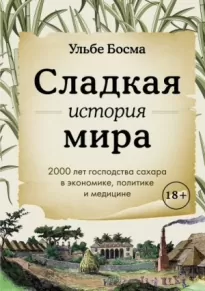Сладкая история мира. 2000 лет господства сахара в экономике, политике и медицине

- Автор: Ульбе Босма
- Жанр: Научная литература / Исторические приключения / История: прочее
Читать книгу "Сладкая история мира. 2000 лет господства сахара в экономике, политике и медицине"
9. Американское сахарное королевство
1 Paul Leroy Vogt, The Sugar Refining Industry in the United States: Its Development and Present Condition (Philadelphia: Published for the University, 1908), 2.
2 J. Carlyle Sitterson, «Ante-Bellum Sugar Culture in the South Atlantic States,» Journal of Southern History 3, no. 2 (1937): 179, 181–182, 187.
3 Gordon Patterson, «Raising Cane and Refining Sugar: Florida Crystals and the Fame of Fellsmere,» Florida Historical Quarterly 75, no. 4 (1997): 412.
4 Lucy B. Wayne, Sweet Cane: The Architecture of the Sugar Works of East Florida (Tuscaloosa: University of Alabama Press, 2010), 3, 38–39, 98, 147.
5 Eleanor C.Nordyke and Richard.C.Lee, The Chinese in Hawaii: A Historical and Demographic Perspective (Honolulu: East-West Center, 1990), 197; Carol A.MacLennan, Sovereign Sugar Industry and Environment in Hawaii (Honolulu: University of Hawaii Press, 2014), 85; Dorothy Burne Goebel, «The ‘New England Trade’ and the French West Indies, 1763–1774: A Study in Trade Policies,» William and Mary Quarterly 20, no. 3 (1963): 344; Markus A.Denzel, «Der seewärtige Einfuhrhandel Hamburgs nach den ‘Admiralitätsund Convoygeld-Einnahmebüchern’ (1733–1798): Für Hans Pohl zum 27. März 2015,» Vierteljahrschrift für Sozialund Wirtschaftsgeschichte 102, no. 2 (2015): 150. См.: Nathaniel Bowditch and Mary C. McHale, Early American-Philippine Trade: The Journal of Nathaniel Bowditch in Manila, 1796 (New Haven, CT: Yale University, Southeast Asia Studies / Cellar Book Shop, Detroit, 1962).
6 C.Y.Shephard, «The Sugar Industry of the British West Indies and British Guiana with Special Reference to Trinidad,» Economic Geography 5, no. 2 (1929): 151.
7 Sumner J.La Croix and Christopher Grandy, «The Political Instability of Reciprocal Trade and the Overthrow of the Hawaiian Kingdom,» Journal of Economic History 57, no. 1 (1997): 172, 181.
8 La Croix and Grandy, «The Political Instability,» 182–183.
9 César J.Ayala and Laird W.Bergad, «Rural Puerto Rico in the Early Twentieth Century Reconsidered: Land and Society, 1899–1915,» Latin American Research Review 37, no. 2 (2002): 66–67.
10 April J.Mayes, The Mulatto Republic: Class, Race, and Dominican National Identity (Gainesville: University Press of Florida, 2015), 48–49.
11 Mark Schmitz, «The Transformation of the Southern Cane Sugar Sector: 1860–1930,» Agricultural History 53, no. 1 (1979): 284.
12 Herbert Myrick, Sugar: A New and Profitable Industry in the United States… (New York: Orange Judd, 1897), 1.
13 April Merleaux, Sugar and Civilization: American Empire and the Cultural Politics of Sweetness (Chapel Hill: University of North Carolina Press, 2015), 33–38.
14 Merleaux, Sugar and Civilization, 36–37.
15 F.Schneider, «Sugar,» Foreign Affairs 4, no. 2 (1926): 320; Frank R.Rutter, «The Sugar Question in the United States,» Quarterly Journal of Economics 17, no. 1 (1902): 79.
16 См.: Sven Beckert, The Monied Metropolis: New York City and the Consolidation of the American Bourgeoisie, 1850–1896 (Cambridge: Cambridge University Press, 2001).
17 Deborah Jean Warner, Sweet Stuff: An American History of Sweeteners from Sugar to Sucralose (Washington, DC: Smithsonian Institution Scholarly Press / Rowman and Littlefield, 2011), 8.
18 Christian Schnakenbourg, «La disparition des ‘habitation-sucreries’ en Guadeloupe (1848–1906): Recherche sur la désagrégation des structures préindustrielles de la production sucrière antillaise après l’abolition de l’eslavage,» Revue française d’Histoire d’Outre-Mer 74, no. 276 (1987): 288.
19 Warner, Sweet Stuff, 23; Alfred S. Eichner, The Emergence of Oligopoly: Sugar Refining as a Case Study (Baltimore, MD: Johns Hopkins Press, 1969), 52–55.
20 Eichner, The Emergence of Oligopoly, 59, 65, 69, 72.
21 Eichner, The Emergence of Oligopoly, 84–87.
22 Eichner, The Emergence of Oligopoly, 16, 150, 152, 184–187.
23 J.Carlyle Sitterson, Sugar Country: The Cane Sugar Industry in the South 1753–1950 (Lexington: University of Kentucky Press, 1953), 302, 312.
24 Jacob Adler, Claus Spreckels: The Sugar King in Hawaii (Honolulu: Mutual, 1966), 101.
25 Adler, Claus Spreckels, 29; To Fight the Sugar Trust: Claus Spreckels as Belligerent as Ever and Ready for the Fray, New York Times, April 25, 1889; Eichner, The Emergence of Oligopoly, 153–154.
26 Eichner, The Emergence of Oligopoly, 166, 172.
27 James Burnley, Millionaires and Kings of Enterprise: The Marvellous Careers of Some Americans Who by Pluck, Foresight, and Energy Have Made Themselves Masters in the Fields of Industry and Finance (London: Harmsworth Brothers, 1901), 212.
28 Shephard, «The Sugar Industry,» 151.
29 Henry Steel Olcott, Sorgho and Imphee, the Chinese and African Sugar Canes: A Treatise upon Their Origin, Varieties and Culture, Their Value as a Forage Crop, and the Manufacture of Sugar… (New York: A. O. Moore, 1858), 23.
30 Warner, Sweet Stuff, 145.
31 Olcott, Sorgho and Imphee, 27; C. Plug, «Wray, Mr Leonard Hume,» in S2A3 Biographical Database of Southern African Science, дата обращения: 10.04.2022, s2a3.org.za/bio/Biograph_final.php?serial=3197.
32 Olcott, Sorgho and Imphee, 228, 230–231.
33 Olcott, Sorgho and Imphee, iv, v, 243–245; Warner, Sweet Stuff, 146; Isaac A.Hedges and William Clough, Sorgo or the Northern Sugar Plant (Cincinnati, OH: Applegate, 1863), vi.
34 Warner, Sweet Stuff, 150, 153.
35 Leonard J. Arrington, «Science, Government, and Enterprise in Economic Development: The Western Beet Sugar Industry,» Agricultural History 41, no. 1 (1967): 5.
36 Adler, Claus Spreckels, 25.
37 Warner, Sweet Stuff, 94; Alfred Dezendorf, «Henry T. Oxnard at Home,» San Francisco Sunday Call 90, no. 40 (July 10, 1904).
38 Jack R.Preston, «Heyward G. Leavitt’s Influence on Sugar Beets and Irrigation in Nebraska,» Agricultural History 76, no. 2 (2002): 382–383.
39 Arrington, «Science, Government, and Enterprise,» 15–17; Thomas J. Osborne, «Claus Spreckels and the Oxnard Brothers: Pioneer Developers of California’s Beet Sugar Industry, 1890–1900,» Southern California Quarterly 54, no. 2 (1972): 119–121; Eichner, The Emergence of Oligopoly, 232.
40 Gerald D.Nash, «The Sugar Beet Industry and Economic Growth in the West,» Agricultural History 41, no. 1 (1967): 29. См.: Preston, «Heyward G.Leavitt’s Influence.»
41 Anonymous, «American Beet Sugar Company,» Louisiana Planter and Sugar Manufacturer 2, no. 17 (1899): 268; Eichner, The Emergence of Oligopoly, 243–244.
42 Matthew C.Godfrey, Religion, Politics, and Sugar: The Mormon Church, the Federal Government, and the Utah-Idaho Sugar Company, 1907–1921 (Logan: Utah State University Press, 2007), 62–64.
43 Matthew C.Godfrey, «The Shadow of Mormon Cooperation: The Business Policies of Charles Nibley, Western Sugar Magnate in the Early 1900s,» Pacific Northwest Quarterly 94, no. 3 (2003): 131; Godfrey, Religion, Politics, and Sugar, 65, chap. 3, 107–117; Eichner, The Emergence of Oligopoly, 239–240.
44 César J.Ayala, American Sugar Kingdom: The Plantation Economy of the Spanish Caribbean, 1898–1934 (Chapel Hill: University of North Carolina, 1999), 36, 57.
45 См.: Edwin Farnsworth Atkins, Sixty Years in Cuba: Reminiscences… (Cambridge: Riverside Press, 1926), 108; Ayala, American Sugar Kingdom, 94.
46 Atkins, Sixty Years in Cuba, 186.
47 Mary Speck, «Prosperity, Progress, and Wealth: Cuban Enterprise during the Early Republic, 1902–1927,» Cuban Studies, no. 36 (2005): 53.
48 Ayala, American Sugar Kingdom, 58–62; Antonio Santamaría García, «El progreso del azúcar es el progreso de Cuba: La industria azucarera y la economía cubana a principios del siglo XX desde el análisis de una fuente: El Azúcar. Revista Industrial Técnico-Práctica,» Caribbean Studies 42, no. 2 (2014): 74.
49 Ayala, American Sugar Kingdom, 80.
50 Robert B.Hoernel, «Sugar and Social Change in Oriente, Cuba, 1898–1946,» Journal of Latin American Studies 8, no. 2 (1976): 229, 239.
51 Ayala, American Sugar Kingdom, 80, 94–95.
52 Muriel McAvoy, Sugar Baron: Manuel Rionda and the Fortunes of Pre-Castro Cuba (Gainesville: University Press of Florida, 2003), 22–23.
53 R.W.Beachey, The British West Indies Sugar Industry in the Late 19th Century (Oxford: B. Blackwell, 1957), 128–132.
54 McAvoy, Sugar Baron, 73.
55 E.M.Brunn, «The New York Coffee and Sugar Exchange,» Annals of the American Academy of Political and Social Science 155 (1931): 112; McAvoy, Sugar Baron, 73.
56 McAvoy, Sugar Baron, 82–83, 95, 199; Ayala, American Sugar Kingdom, 88–89.
57 Rémy Herrera, «Where Is Cuba Heading? When the Names of the Emperors Were Morgan and Rockefeller… Prerevolutionary Cuba’s Dependency with Regard to U.S. High Finance,» International Journal of Political Economy 34, no. 4 (2005): 33–34, 46.
58 Boris C.Swerling, «Domestic Control of an Export Industry: Cuban Sugar,» Journal of Farm Economics 33, no. 3 (1951): 346; Speck, «Prosperity, Progress, and Wealth,» 54.
59 Laura Mason, Sweets and Candy: A Global History (London: Reaktion Books, 2018), 71.
60 Michael D’Antonio, Hershey: Milton S.Hershey’s Extraordinary Life of Wealth, Empire, and Utopian Dreams (New York: Simon and Schuster, 2006), 36–59.
61 D’Antonio, Hershey, 106–107, 131, 161–166.
62 Thomas R.Winpenny, «Milton S. Hershey Ventures into Cuban Sugar,» Pennsylvania History: A Journal of Mid-Atlantic Studies 62, no. 4 (1995): 495.
63 Ayala, American Sugar Kingdom, 83–84, 95.
64 Peter James Hudson, Bankers and Empire: How Wall Street Colonized the Caribbean (Chicago: University of Chicago Press, 2018), 147, 189, 202.
65 См.: Hudson, Bankers and Empire.
66 Ayala, American Sugar Kingdom, 108, 112–115, 226–227, 240; Victor Selden Clark, Porto Rico and Its Problems (Washington, DC: Brookings Institution, 1930), 404, 431; Harvey S.Perloff, Puerto Rico’s Economic Future: A Study in Planned Development (Chicago: University of Chicago Press, 1950), 136.
67 John Emery Stahl, «Economic Development through Land Reform in Puerto Rico» (PhD diss., Iowa State University of Science and Technology, 1966), 11–12; J.O.Solá, «Colonialism, Planters, Sugarcane, and the Agrarian Economy of Caguas, Puerto Rico, between the 1890s and 1930,» Agricultural History 85, no. 3 (2011): 359–361; Javier Alemán Iglesias, «Agricultores independientes: Una introducción al origen de los colonos en el municipios de juncos y sus contratos de siembra y molienda, 1905–1928,» Revista de los Historiadores de la Región Oriental de Puerto Rico, no. 3 (2019): 32–36.
68 Matthew O.Edel, «Land Reform in Puerto Rico, 1940–1959,» Caribbean Studies 2, no. 3 (1962): 28–29.
69 Ellen D.Tillman, Dollar Diplomacy by Force: Nation-Building and Resistance in the Dominican Republic (Chapel Hill: University of North Carolina Press, 2016), 70; Ayala, American Sugar Kingdom, 106–107; Humberto García Muñiz, Sugar and Power in the Caribbean: The South Porto Rico Sugar Company in Puerto Rico and the Dominican Republic, 1900–1921 (San Juan, Puerto Rico: La Editorial, 2010), 261, 330.
70 Bruce J.Calder, «Caudillos and Gavilleros versus the United States Marines: Guerrilla Insurgency during the Dominican Intervention, 1916–1924,» Hispanic American Historical Review 58, no. 4 (1978): 657–658.
71 Louis A.Pérez, «Politics, Peasants, and People of Color: The 1912 ‘Race War’ in Cuba Reconsidered,» Hispanic American Historical Review 66, no. 3 (1986): 533–537.
72 Sara Kozameh, «Black, Radical, and Campesino in Revolutionary Cuba,» Souls 21, no. 4 (2019): 298.
73 Serge Cherniguin, «The Sugar Workers of Negros, Philippines,» Community Development Journal 23, no. 3 (1988): 188, 194.
74 Jeffrey L. Gould, «The Enchanted Burro, Bayonets and the Business of Making Sugar: State, Capital, and Labor Relations in the Ingenio San Antonio, 1912–1926,» The Americas 46, no. 2 (1989): 167–168.
75 Volker Schult, «The San Jose Sugar Hacienda,» Philippine Studies 39, no. 4 (1991): 461–462.
76 Myrick, Sugar, 19.
77 Gail M. Hollander, Raising Cane in the ’Glades: The Global Sugar Trade and the Transformation of Florida (Chicago: University of Chicago Press, 2009), 23.
78 См.: Pat Dodson, «Hamilton Disston’s St. Cloud Sugar Plantation, 1887–1901,» Florida Historical Quarterly 49, no. 4 (1971): 356–369.
79 Hollander, Raising Cane, 86.
80 John A. Heitmann, «The Beginnings of Big Sugar in Florida, 1920–1945,» Florida Historical Quarterly 77, no. 1 (1998): 50–54; Geoff Burrows and Ralph Shlomowitz, «The Lag in the Mechanization of the Sugarcane Harvest: Some Comparative Perspectives,» Agricultural History 66, no. 3 (1992): 67.
81 См.: Patterson, «Raising Cane,» 416–418.
82 Gail M. Hollander, «Securing Sugar: National Security Discourse and the Establishment of Florida’s sugar-producing region,» Economic Geography 81 (2005): 252–253, 354.
83 «Alfonso Fanjul Sr.,» in Palm Beach County History Online, https://web.archive.org/web/20210926213455/http://www.pbchistoryonline.org/page/alfonso-fanjul-sr, дата обращения: 15.11.2023.





